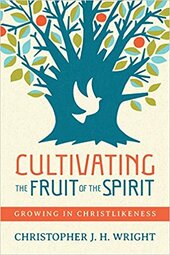At one of the congregations I served as a youth pastor, our youth ministry made care packages for our college students. In return, the college ministry made a giant “Fruits of the Spirit” tree for us out of paper. Although we hung the tree in our youth room, the teens mocked it for years. As a result, I avoided teaching them about the fruits of the spirit, concerned they'd find such a series boring or worse still, a joke.
Recently, however, a children’s book about the fruits of the spirit captured my imagination and made me want to explore them with my high school students. In this book, a little boy wrestles with what God is like. His Grandma answers by pointing out the fruits of the spirit. The little boy then identifies each time he sees a fruit of the spirit in the world around him. (1)
As part of my research for this series, I read Christopher J.H. Wright’s Cultivating the Fruit of the Spirit: Growing in Christlikeness. Having read Wright’s fabulous The Mission of God in grad school, I was excited to explore what he had to say about the fruits of the spirit.

As you’d expect from anything written by Wright, the book’s scholarship and the writing are both excellent. Beyond that, though, Cultivating the Fruit of the Spirit explores one fruit of the spirit in each chapter and also includes a helpful introductory chapter that places the fruits of the spirit passage in the larger context of the book of Galatians.
What surprised me about Cultivating the Fruit of the Spirit (even though it probably shouldn’t have) is how much each chapter focuses on what that fruit of the spirit says about God’s character. Until now, it seems that whenever I’ve heard someone teach on the fruits of the spirit, they’ve done so in a way that’s solely about us, forgetting that Christians bear these fruits BECAUSE the Holy Spirit lives in us and enables us to reflect God’s character.
One of my favorite chapters in Cultivating the Fruit of the Spirit is the one on love. Wright frames love as “the answer to both legalism and license.” According to him, “To the law-enforcers Paul says that what really matters is faith expressing itself through love. Love enables us to fulfill God’s law properly without legalism. And to the rule-rejecters Paul says that we should make sure that we serve one another humbly in love. Love enables us to use our freedom properly without selfishness.”
Cultivating the Fruit of the Spirit is a book that anyone interested in learning more about the fruits of the spirit will enjoy. In particular, it’s a helpful resource for pastors and youth workers planning a series on the fruits of the spirit. Because of the good discussion questions found at the end of each chapter, it’d also make for good discussion fodder in a small group setting.
***********************************************
1. The delightful children's book about the fruits of the spirit is Maybe God is Like That, Too.
***********************************************
Disclosure: I received a free copy of Cultivating the Fruit of the Spirit from InterVarsity Press in exchange for a fair and honest review.